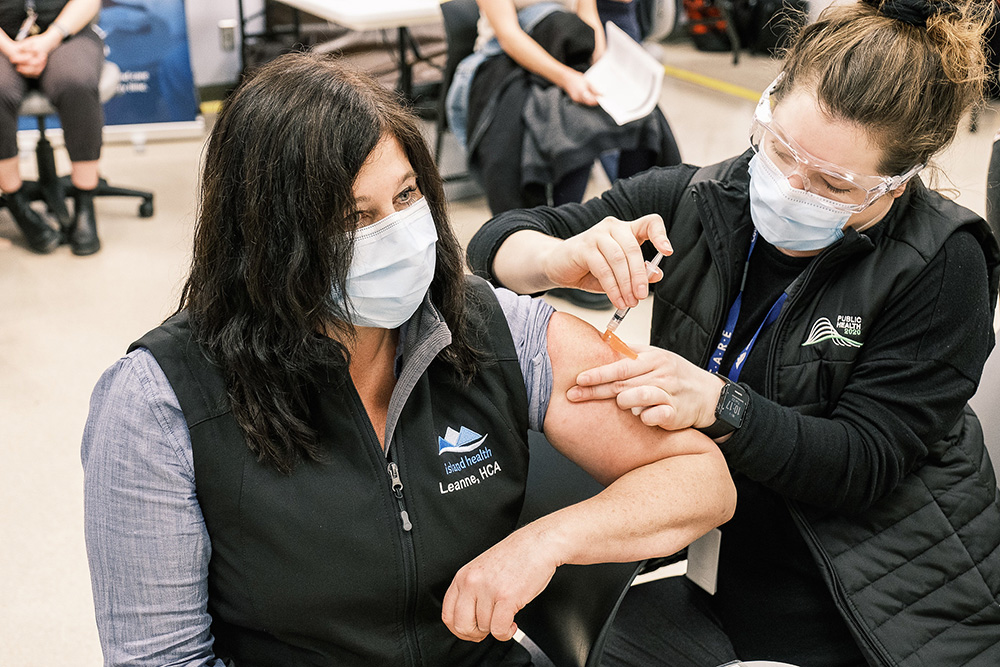More than 320,000 frontline and essential workers will be prioritized for vaccination in the next month as B.C. aims to vaccinate all eligible adults by July 1.
The first shipment of 68,000 AstraZeneca/Covishield doses arrived in B.C. last week and is already being used to target outbreaks in manufacturing, food processing and warehousing facilities and other workplaces.
And in early April, essential workers, including teachers and support staff in elementary and high schools, child-care workers, grocery store employees, first-responders, people living in congregate settings in resort towns or industrial camps and postal workers will receive their first shots.
In total, about 340,000 doses of AstraZeneca are expected to arrive in B.C. by the end of May.
Provincial health officer Dr. Bonnie Henry said today the province chose groups to prioritize based on frequent exposures and outbreaks, their risk of transmission in the broader community, and the challenges they face in using PPE and following distancing measures and self-isolation requirements due to the nature of their workplaces and living arrangements.
“We do know there are a number of industries that are more at risk, and they are having ongoing and repeated outbreaks,” she said. “This allows us to really move ahead with our large shipment of vaccine to target these groups of people who we know are essential for keeping our communities going and who have been working throughout this pandemic.”
“We know these outbreaks are disproportionately affecting racialized communities and low-wage earners, and this is what we’re thinking about as we start to tackle that.”
Health Minister Adrian Dix said outbreaks have occurred even when workplace safety plans were followed to the letter, and they will still need to be followed after workers are vaccinated.
“This is not about blame, this is about an effective public health response,” he said.
Dr. Penny Ballem, the province’s vaccine strategy head, said more than 444,000 doses have been given since December.
The decision to delay second doses, which all three available vaccines currently require for maximum effectiveness, has allowed the province to give first doses to more people, she said.
B.C. is on track to vaccinate about a quarter of the 4.7 million eligible adults by the end of March, Ballem said.
Seniors aged 70 to 79 will be able to book vaccines in the coming weeks, starting with 79-year-olds on Saturday. Indigenous people aged 55 and older will also be eligible to book their appointments on Saturday, more than a week ahead of schedule.
Those who are clinically vulnerable, such as cancer or organ transplant patients of all ages, will also be prioritized and should be able to be vaccinated before April 18.
And the knock-on effect of the AstraZeneca availability will see the last group eligible, healthy 18 to 24-year-olds, receive their shots by the end of June, three months earlier than initially planned.
A central online and phone booking system will be operational by the beginning of April as the vaccination effort expands to the general population.
There is no timeline yet for the arrival of the Johnson & Johnson vaccine, a single-dose shot that Health Canada recently approved, but it could move up the timeline even more, Ballem said.
“We’re looking at a bounty of vaccine, which is a remarkable opportunity,” she noted.
Henry cautioned that restrictions will likely stay the same for the coming two months in an effort to prevent the spread of variants before a significant proportion of the community is vaccinated.
The B117 variant first identified in the United Kingdom now represents about 12 per cent of new cases in the province, Henry said.
At the moment variant cases are replacing the old virus and not driving transmission, Henry said, but a third, variant-driven wave is entirely possible if British Columbians don’t continue to follow restrictions.
“By June, if we are able to deliver and able to keep a third wave from taking off, then we can look at taking away some restrictions,” said Henry.
Large gatherings and events are out of the question until then, but she hopes the summer and fall will bring more opportunities for larger weddings, funerals and graduation ceremonies.
Henry and Dix also assured loved ones of long-term care residents that relaxed visitation rules would be announced before the end of the month.
Henry said it’s important to lower rates even as the vaccination efforts continue.
“We’ll have to be more cautious for longer if our rates stay as high as they are… this is all of our challenge right now,” said Henry.
“We have a smaller margin of error for our individual actions to prevent transmission, and for our group actions.” ![]()
Read more: Health, Coronavirus

















Tyee Commenting Guidelines
Comments that violate guidelines risk being deleted, and violations may result in a temporary or permanent user ban. Maintain the spirit of good conversation to stay in the discussion.
*Please note The Tyee is not a forum for spreading misinformation about COVID-19, denying its existence or minimizing its risk to public health.
Do:
Do not: